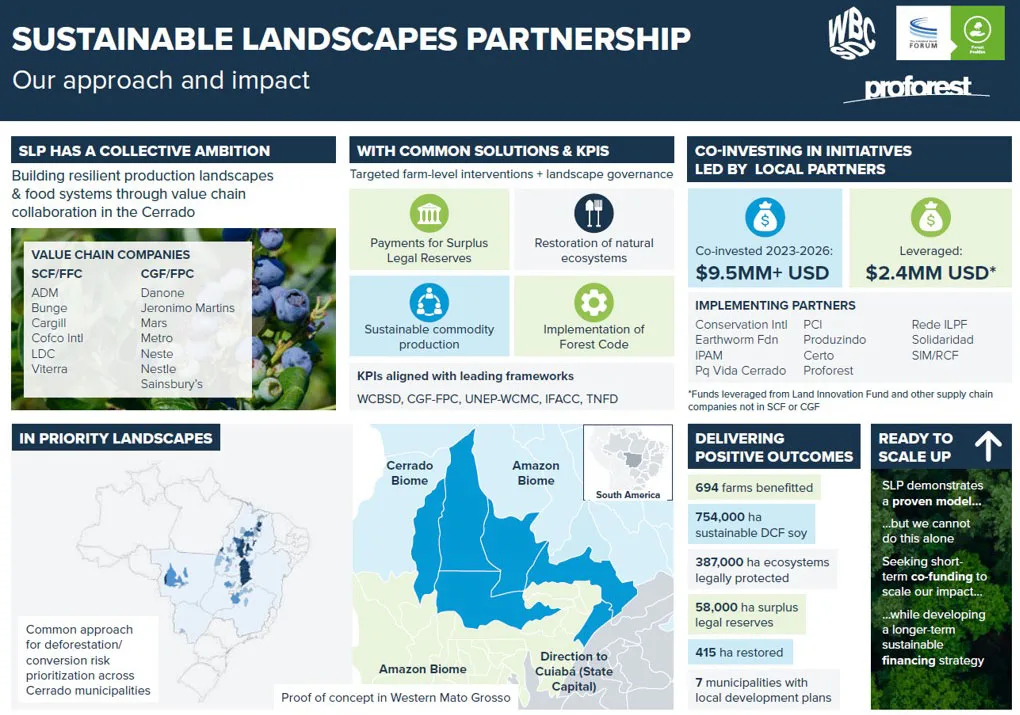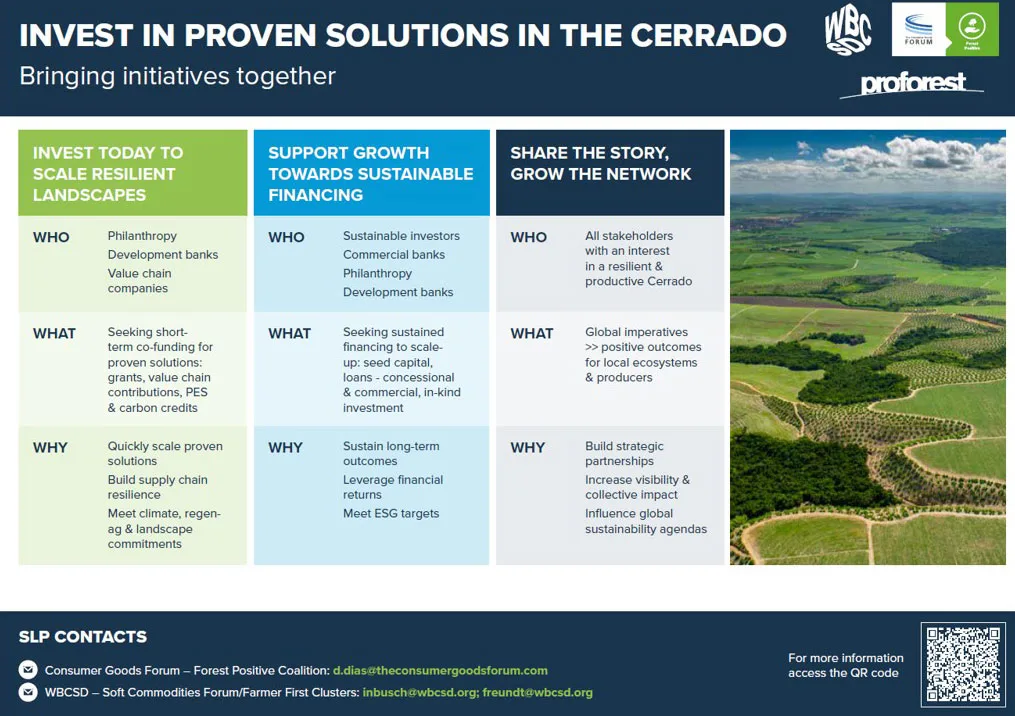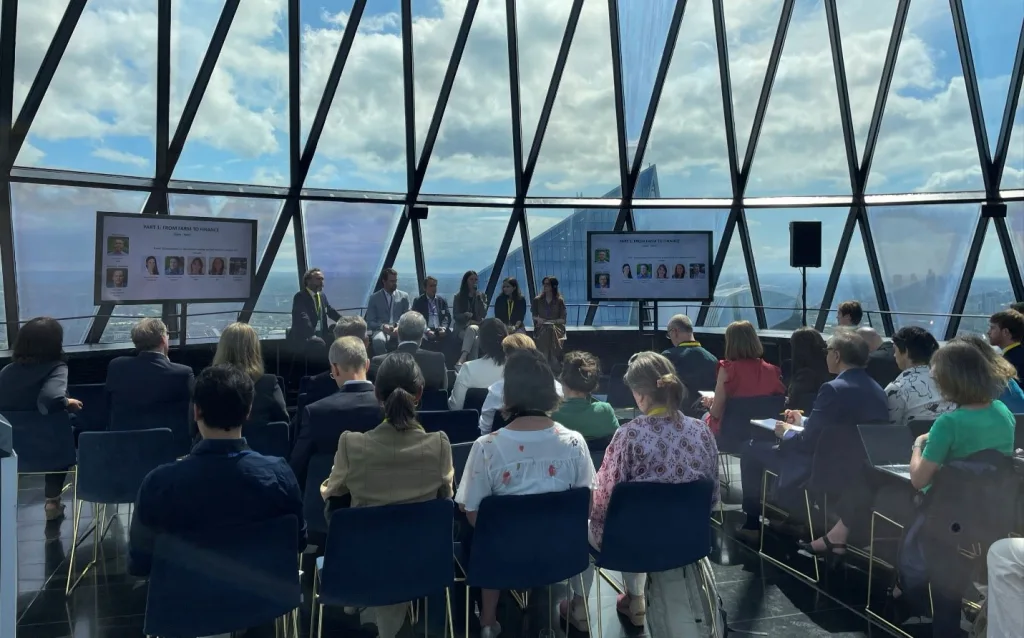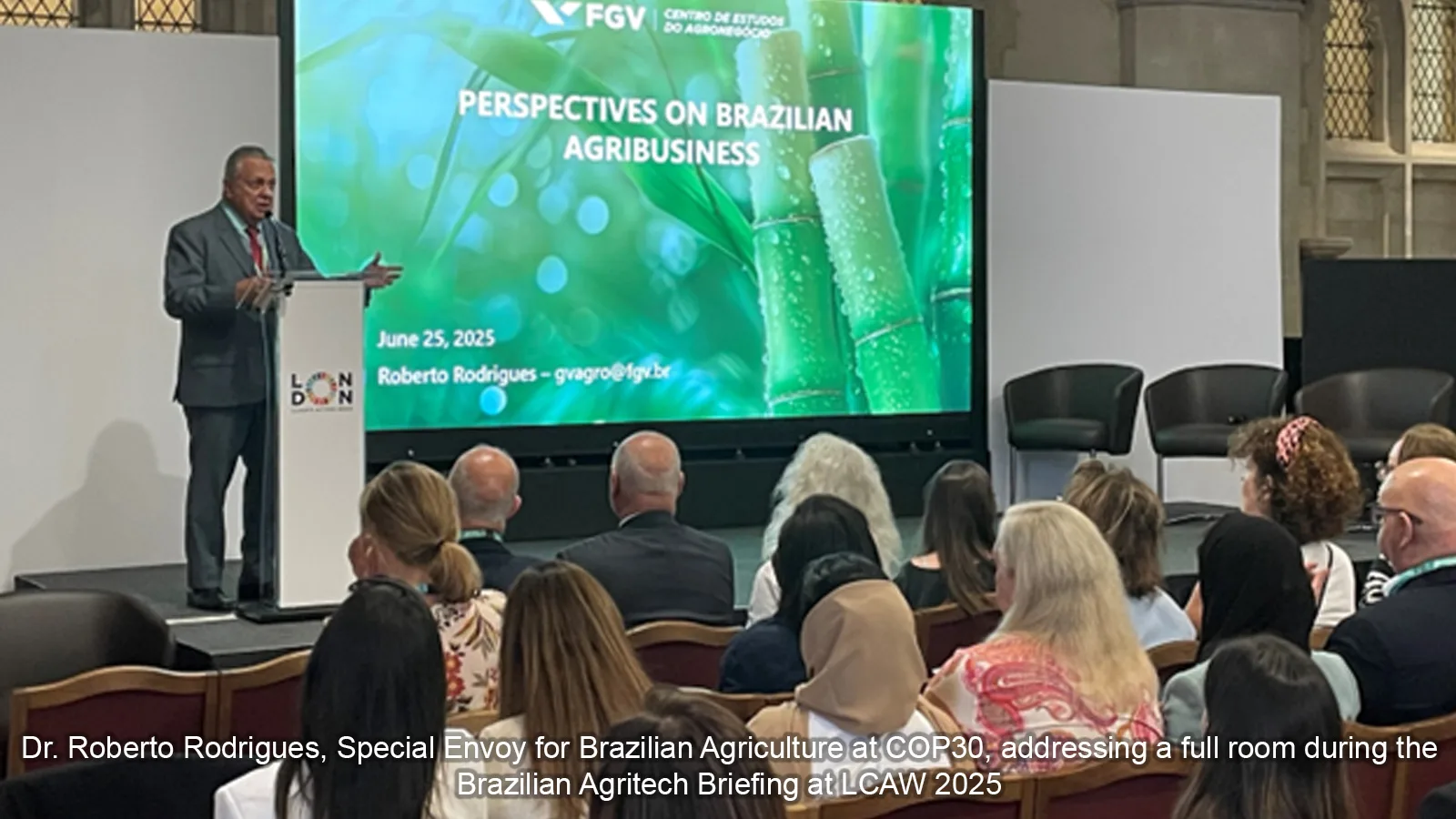The Soft Commodities Forum (SCF) and its partners from Tropical Forrest Alliance, IDH, Olab, Proforest, Responsible Commodities Facility, Sustainable Investment Management, The Consumer Goods Forum – Forest Positive Coalition, and WWF, had a strong presence at London Climate Action Week 2025, standing out amid the high energy and packed rooms focused on Brazil’s critical role in global climate and food system solutions. From regenerative agriculture to forest conservation, support was loud and clear for the urgent need to scale-up holistic, landscape-scale approaches – many of which were on display throughout the week.
As part of the week’s events the Sustainable Landscapes Partnership (SLP), a joint initiative between tThe Consumer Goods Forum’s Forest Positive Coalition (CGF-FPC) and the World Business Council for Sustainable Development’s Soft Commodities Forum (WBCSD-SCF) – organized a session with partners on Transition Finance for Resilient Agricultural Systems. The session aimed to place the spotlight on Brazil’s Cerrado biome, engaging a diverse array of stakeholders, focusing on a highly pressing question:
How can finance accelerate the shift toward sustainable, deforestation- and conversion-free (DCF) agriculture in one of the world’s most ecologically critical and agriculturally productive regions?

The session included interventions from leading programs advancing sustainable agriculture and land-use across the Cerrado, including the Responsible Commodities Facility (RCF), Agri3, WWF, IDH and others. At the heart of these discussions was a shared concern: Supporting the Cerrado’s continued growth as a vital agricultural hub is essential for food security and rural livelihoods. It is of critical importance to protect its unique and irreplaceable ecosystems, which make up a global biodiversity hotspot, a major carbon sink, and a source of drinking water and hydropower for millions of Brazilians.
The SLP is a key piece in a constellation of complementary solutions. Recognizing that isolated efforts aren’t enough, the SLP brings together value chain actors behind a shared vision for resilient, DCF landscapes. To date, the partnership has mobilized nearly $10 million in joint investment (plus $2.4 million leveraged), supported improved livelihoods on 700+ farms, and advanced climate and nature outcomes across 800,000 hectares. Now, in a crucial moment of expansion, the partnership is seeking $10 million in near-term co-funding and over $10 million annually in sustained, blended capital to scale impact. With multiple pathways to engage, the message is clear: this model works – now is the time to scale it up for an even larger impact.
Co‑organizers have been advancing sustainable production landscapes and value chains in the Brazilian Cerrado, supported by pioneering initiatives and investors. The event at LCAW became an open forum for lessons learned, benefits, and challenges facing producers and financiers, highlighting collaborative projects that are strengthening productive, traceable and sustainable landscapes in the Cerrado.
There were two engaging panel discussions as part of the session. On the first panel, COFCO International represented the Soft Commodities Forum by introducing the SLP as a unique model of value-chain collaboration in a room largely focused on finance. They shared how the program has evolved from early-stage grant funding, combining flagship pilot programs under the SCF’s Farmer First Clusters and parallel investments by downstream members of the CGF-FPC, towards a scalable vision for long-term sustainable finance, setting a clear path forward for transformative landscape investment.

A second panel included perspectives from financial stakeholders such as Rabobank, Agri3 Fund and more. CGF-FPC member Sainsburys brought the retailer perspective to the panel, articulating the value proposition for improving supply chain resilience and investing directly in sustainable solutions at the source of goods that end up on their shelves.
It was a high-energy session oriented towards understanding solutions, implementation gaps and facilitating matchmaking across stakeholders to accelerate collective solutions in the Cerrado. It certainly helped that it was held high atop the famous Gherkin, a spectacular backdrop for an important dialogue.

Building a Scalable Long-term Financial Model
A key theme during LCAW, and particularly during the CGF-FPC session, was the shift from short-term grant funding to long-term, scalable financing models. While public and philanthropic capital remain essential for early-stage support and risk mitigation, participants emphasized the need for innovative financing mechanisms that can attract investment into sustainable landscapes. This includes blended finance models that combine grants, technical assistance, and patient capital to support producers and project developers.
An exciting announcement came from the Brazilian Treasury about their newly renamed “Caminho Verde” or Green Way program which aims to channel public funds into highly subsidized loans for regenerating degraded pastures, a top lever for advancing regenerative agriculture, while reducing pressure for land-clearing by utilizing long-cleared land. SCF, CGF – FPC and partners will look for opportunities to access this funding to expand their impact in this area, which is already part of ”the smart mix” of solutions under the SLP and a top priority for the Brazilian government.
Aligning the Value Chain
Speakers stressed the importance of value‑chain alignment, from upstream producers to downstream offtakers and retailers. Efforts to promote traceability – particularly for indirect suppliers, harmonize risk methodologies and reporting, and align incentives are essential to building transparent DCF supply chains across the Cerrado and beyond.
The Soft Commodities Forum and the Forest Positive Coalition continue to collaborate on these strategic points. During LCAW members of both groups held a closed‑door session to deepen coordination on DCF sourcing and reporting – covering indirect supply chains and municipal‑level risk assessment – and to advance joint landscape investments in the Cerrado’s highest‑risk areas, maximizing shared resources and impact under the SLP.
A Call for Collective Action
Systemic change cannot be achieved by any one actor alone. Building resilient landscapes and sustainable food systems demands stronger collaboration across corporates, investors, governments, and civil society. While a single solution may not exist, a clear message from the week was the need to better articulate the purpose behind each initiative, align efforts with the right types of funders and investors, and, where possible, coordinate or even integrate approaches to amplify impact and unlock greater investment.
The SLP remains a vital platform for collective action on DCF soy production in the Cerrado – aligning stakeholders and methods, mobilizing capital, and driving progress toward a future where agriculture supports both people and planet.
Interested in learning more about the SLP and its impacts in the Cerrado and future opportunities to scale up? Please reach out to Debora Dias (d.dias@theconsumergoodsforum.com) or Matt Inbusch (inbusch@wbcsd.org) for more information on how you can get involved.
Outline
